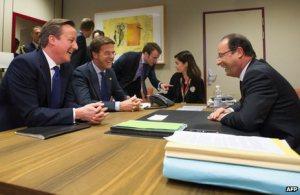
With the recent EU budget being agreed across all EU member states, how will this affect the UK and EU relations as a whole?
“I didn’t quite get a thank you!” as the PM mocked Ed Miliband when addressing MPs on the EU Budget Summit. The Tories knew the political impact of not delivering a cut in the EU budget. Labour’s political move to vote with the rebellious Tory MPs against the Government to demand a cut in the budget; a move Disraeli would be proud of. With UKIP’s support rising, and eurosceptic MPs having the potential to cause issues for the Government, Cameron needed to secure a cut in the EU budget for not just economic reasons, but political reasons for his party too.
Although the EU budget negotiations began before Cameron’s big speech on the UK’s future in the EU (by promising a referendum in 2017 after a fresh settlement,) divisions between the eurosceptics and the more EU friendly Tory MPs were still bubbling under the surface at the time. Considering, UKIP is still strong in the polls, as long as Cameron can show himself as defending against the EU in favour of British interests,the UKIP support could burst away in a General Election campaign as the infamous wasted vote syndrome plays on people’s mind. Although the General Election is still 2 years away, events such as the EU budget negotiations can play a key part in how in particular UKIP and eurosceptic supporters will vote.
Therefore once the negotiations were underway, certain alliances and the tactics of individual countries became very clear, France and Germany in particular. In the first summit in November, the tactics of Merkel was stark, as she was “determined not to isolate David Cameron” at the summit. [1] This can be judged for tactical reasons as the German Chancellor did not wish to potentially provoke further euroscepticism in the UK if it seen that the EU was ganging up on the UK like a little kid in the playpen, taking its candy with seemingly no benefits to the UK. Merkel had the tenacity to avoid that issue by supporting Cameron’s wishes for a cut in the EU budget. However, this support also benefited German self-interests, as Merkel supported austerity, just like Cameron, as they are both from Conservative parties.
This German interest to support the UK also included other nations to voice their support in cutting the EU budget, such as the Netherlands, Sweden and other Northern European countries who pay more into the EU than they receive. Although this is a significant amount of support to Cameron, and shows that he is not isolated in the EU, it is highly likely that any EU budget cut would not of came if the Germans did not give their support and in particular Merkel’s tactics of ensuring Cameron would not be isolated against the aggressive moves of Barroso and Van Rompuy in trying to push the British into a corner.
Furthermore, the negotiations in the EU budget highlighted the key divisions in the increasingly strained Anglo-French relations, with Hollande threatening the UK rebate, with demands for a £3bn cut in return for any agreement in a EU budget cut [2] Hollande even went to the extent of staying away from a meeting with Cameron and Merkel in forging a compromise a couple of weeks ago. [3] We can therefore see a potential new Anglo-German friendship based on similar ideological beliefs (Conservatism, austerity) and quite possibly alienating the Socialist French leader if it benefits both the UK and Germany.
Although the economy, NHS and Welfare and more likely to be more important in the 2015 General Election, the EU will still play a crucial part in regard to how many votes UKIP receives. If The Tories are too eurosceptic they could alienate possible centre-ground voters, and if they’re not eurosceptic enough UKIP’s vote could soar and ensure Ed Miliband waddles into 10 Downing Street as the new PM.
Written by Lily Jayne Summers.
[1] – http://www.guardian.co.uk/politics/wintour-and-watt/2012/nov/23/eu-davidcameron
[2] – http://www.telegraph.co.uk/news/worldnews/europe/eu/9699877/French-threat-to-UK-rebate-as-EU-budget-talks-collapse.html
[3] – http://www.guardian.co.uk/world/2013/feb/08/david-cameron-hollande-merkel-negotiations

